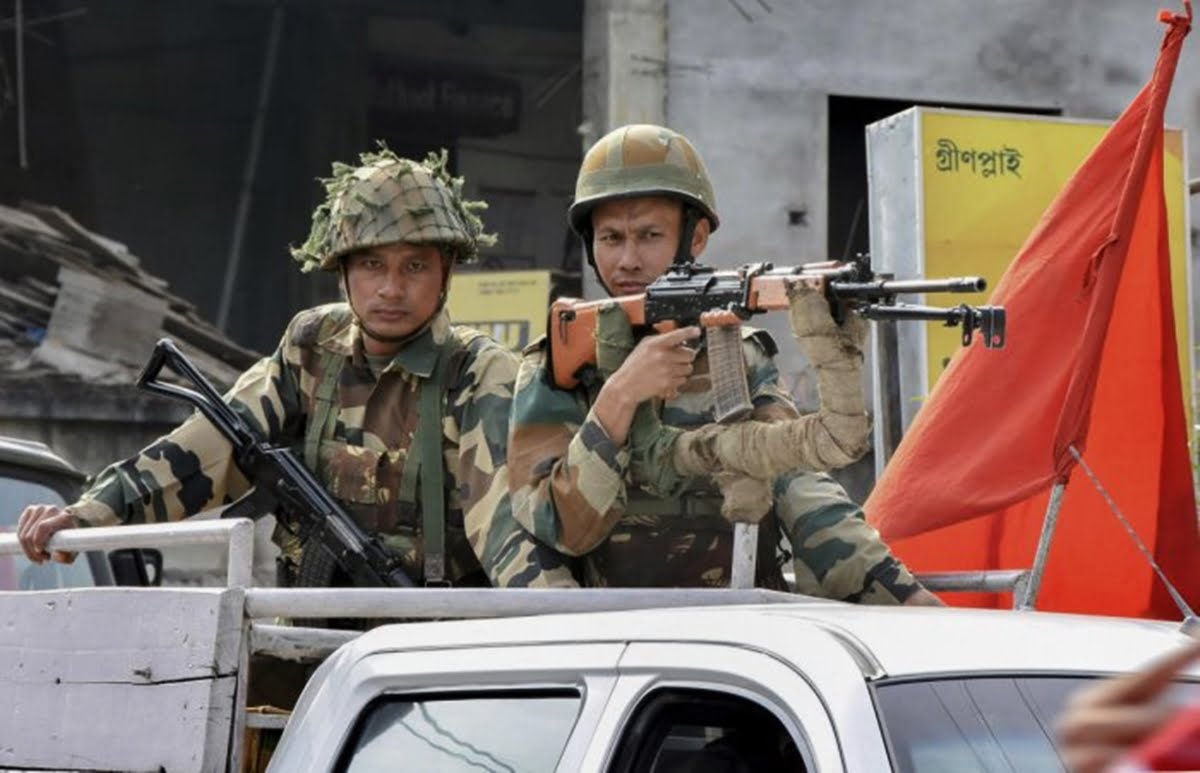What do you get when you mix a group of men with unfiltered power and no restriction with a hyper-nationalist environment? You have nightmares on which everyone keeps mum. The recent violence in Nagaland has been an eye-opener for a few of the ‘liberal’ mainlanders, when for me; a northeastern, it, unfortunately, isn’t anything new. For the people who still remain oblivious to the recent unfolding, Nagaland has been going through a brutal uprising after soldiers gunned down 13 civilians in an ambush. The people caught in the middle of the fire were coal miners returning home.
Nagaland has been going through a brutal uprising after soldiers gunned down 13 civilians in an ambush. The people caught in the middle of the fire were coal miners returning home.
Home Minister Amit Shah was found ‘justifying’ the act by saying the coal miners were signaled to stop but they did not, leading to a misunderstanding. This statement has been criticized by Nagaland state’s BJP leadership itself. One of the survivors themselves commented that they were not given any kind of signal.
During a recent session of Parliament, Home Minister Amit Shah was found ‘justifying’ the act by saying the coal miners were signaled to stop but they did not, leading to a misunderstanding. This statement has been criticized by Nagaland state’s BJP leadership itself. One of the survivors themselves commented that they were not given any kind of signal.

The situation has rekindled an age-old debate which many of the mainlanders have never given much thought to; the issue of AFSPA. The Armed Forces Special Power Act is a stringent law that gives the military a certain set of special powers to maintain “peace” in certain disturbed territories; which mainly include a few of the Northeastern states and Jammu and Kashmir. Since Nagaland falls under the above-mentioned “disturbed territory”, the locals believe this issue will also be swept under the rug. Central Government has talked about setting up a Special Investigation Team, a plotline that every story dealing with AFSPA follows but in vain.
Also read: Book Review: The Mothers Of Manipur By Teresa Rehman

The reason why this was not an “eye-opener” for a northeastern like me, as it was for some mainlanders is that such situations have been happening for decades now. In the year 2004, a 32-year-old Thangjam Manorama was picked up from her house late at night in suspicion of being a militant. Her family was not provided any information, as according to AFSPA, the military has the power to arrest people without a warrant or evidence. The last words spoken by her were of asking her brother and mother to come by the police station as soon as possible to take her back home.
But, unfortunately, her bullet-ridden body was found the next day. Investigations later revealed that the woman was tortured and raped as well. There were a lot of disparities between the official version and the investigation which led to protests. The next month a group of 30 Manipuri women marched naked to the headquarters of the 17th Assam Rifle Regiment. The mothers’ disheveled hair and uncovered bodies were a mark of raw anger, which every human there was going through. They went unbothered and without feeling embarrassed while holding a big banner where the words “Indian Army Rape Us” were written in bloody red paint. The matter is still pending as it falls under the purview of draconian AFSPA.

In 2015, an army regiment entered a village in Karbi Anglong, Assam. They molested a lot of women and took off with a 15-year-old. Her mother and another woman followed them but were captured by the army men as well. All three were brutally raped. None of the jawans were arrested because again, it fell under the Armed Forces Special Powers Act. The previous central government has claimed at times that AFSPA cannot be used to protect rapists in the army but time and again, this statement has proven to be false. Even when widespread protests took place in the region; it was suppressed by claiming that the agitation was being organised by insurgent groups who are demanding separate statehood for the region.
In June this year, a major of 44 Assam Riffles of the Indian Army was accused of killing a civilian in Manipur. This took place in Chalwa village of Manipur’s Kangpokpi district. Alok Sathe, commanding officer of the 44 Assam Rifles shot Mangboilal Lhouvum, a 29-year old father of four. The regiment claimed that the person was caught up between crossfires meant to capture members of an insurgent group but according to locals and social workers, there weren’t any in the whole village. This was yet another abuse of the draconian AFSPA.
Also read: Remembering Thangjam Manorama | #IndianWomenInHistory
In June this year, a major of 44 Assam Riffles of the Indian Army was accused of killing a civilian in Manipur. This took place in Chalwa village of Manipur’s Kangpokpi district. Alok Sathe, commanding officer of the 44 Assam Rifles shot Mangboilal Lhouvum, a 29-year old father of four. The regiment claimed that the person was caught up between crossfires meant to capture members of an insurgent group but according to locals and social workers, there weren’t any in the whole village. This was yet another abuse of the draconian AFSPA.
These are only a few of the reported cases. One can only imagine the magnitude of cases that go unreported. All the previous scenarios of violence, if taken into serious consideration, could have worked as a warning. Being born in Assam, stories of such brutality are the major nightmares that we have grown up with. These things have been happening for ages and will keep on happening if the issue of accountability is never pondered upon. For us, such occurrences have worked as cautionary tales; warning us of which regions to travel to and which places to stay away from. Mainlanders had the privilege of never thinking of such issues but as the recent case is gaining a little momentum, a conversation has begun, even if not a major one.
The question I have always reflected upon is what are people waiting for? The previous cases should have worked as a conversation starter but did not, insulting all the people who have fallen prey to the severe law. As long as AFSPA is not repealed or at least not revamped, the situations will continue to happen. Even the chief ministers of Meghalaya and Nagaland have made statements asking the center to outlaw AFSPA. Let us take this case as an example of what we have to work upon.
Repeal AFSPA. Save the law.
Ayanabha Banerjee is an aspiring writer who hails from the northeast and identifies as queer. The self proclaimed workaholic is pursuing masters in Development Communication from AJK-MCRC, Jamia Milia Islamia; while helping build up a non-profit organization called Maan ki Umeed back home in Guwahati, Assam. He is very vocal about social issues and has never kept silent during political discussions. He also loves to think that his childhood trauma has made his humour better so let’s let him think writing such on a public platform is funny. You can find him on Instagram and Facebook.




